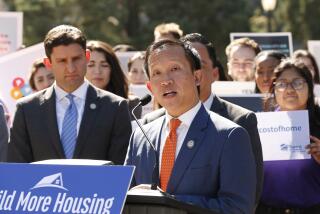The Conscience of L.A.
- Share via
When the Los Angeles City Council votes on a proposed Free Burma Law on Friday, members will be taking a stand not only on the atrocities of the Myanmar dictatorship, but also on the right of Los Angeles to speak out on foreign affairs and to choose how it will spend its tax dollars. That historic right is under ferocious assault by international corporations, which complain that it cramps business.
The law is aimed at repressive policies in the Southeast Asian country that changed its name in 1989, a change not recognized by the government’s opponents. The proposed law is similar to the Los Angeles ordinance that prohibited city contracts with companies doing business in South Africa during apartheid and to a law still on the books against the Arab boycott of Israel.
Archbishop Desmond Tutu has called Myanmar “the South Africa of the ‘90s.” Aung San Suu Kyi, the Nobel Peace laureate whose political party won 82% of the seats in a 1990 election quashed by the military, pleads with the world to enact sanctions against businesses investing in her country: “Putting money into the country,” she says, “is simply supporting a system that is severely harmful to the people.” “Severely harmful” is a euphemism. Ask the students whose universities have been closed for years. Ask the 5 million Myanmar people forced to labor on infrastructure projects. Ask the little girls used as human minesweepers for the army, then raped at night, sometimes with fire-heated bayonets.
There are, to be sure, other repugnant governments in the world deserving rebuke. But the time is ripe to single out Myanmar because there is a significant chance that international pressure could bring down Myanmar’s junta the way it brought down apartheid in South Africa. Myanmar’s economic situation is precarious. The military takes 50% of the national budget, yet there is no foreign enemy. Heroin is a principal export; according to the Drug Enforcement Administration, 60% of the heroin on American streets originates in Myanmar. No other government is the target of such a chorus of condemnation by the United Nations, Europe, other countries and independent monitors like Amnesty International and Human Rights Watch. Congress has prohibited new investment in Myanmar by U.S. companies, and 22 cities and counties as well as the state of Massachusetts have enacted laws saying they will not spend their tax dollars to contract with any company doing business there. Such local sanctions by democratically elected representatives pack a powerful economic and symbolic punch. It is these laws that transnational corporations are hellbent to stop.
The National Foreign Trade Council, a lobbying arm for several hundred large companies, has sued Massachusetts, asserting that the state’s Myanmar law is unconstitutional. The trade council’s real theory is not a legal but an economic one: that capital should be free from moral and social constraints. The council also argues that the federal government has an “exclusive” role in foreign affairs and that Massachusetts has unconstitutionally invaded it. A federal judge bought that argument; the decision, which is nonsense on stilts, is being appealed. But had it been the law, the recent successful efforts by New York and California to pressure Swiss banks to pay Holocaust victims would have been illegal, as would the McBride Principles, which prohibit religious discrimination by companies doing business in Northern Ireland. “Buy America” or “Buy Local” laws of 43 states would be invalid, as would be environmental laws requiring recycled content or prohibiting rain forest wood. The decision ignores not only constitutional text but also history. State and local governments have been involved in foreign affairs for 200 years and now have nearly as many overseas offices as the U.S. government has embassies.
But these local efforts are nettlesome to transnational corporations pursuing profits amorally. They want the global village to themselves. And they want the foreign policy of the United States to speak with one voice, theirs. When the City Council votes on Myanmar, it should make clear that, at least when it comes to deciding how to spend its taxpayers’ dollars, Los Angeles has both a strong voice and a strong conscience.
More to Read
Sign up for Essential California
The most important California stories and recommendations in your inbox every morning.
You may occasionally receive promotional content from the Los Angeles Times.










